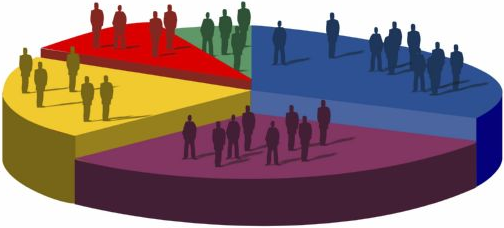E-Voting and Nigeria’s Democracy
An election is an event
at which someone or a group of people is chosen to hold positions of
responsibility or leadership. It ensures
that a leader is chosen by the majority of the populace and not by a powerful
minority. However, some candidates may seek
to get a political office by all means and adopt shady methods or techniques
to manipulate the election results in their favor. This practice has been seen in developed
countries that are presumably at the forefront of democratic governance from
election disputes to alleged rigging by candidates.
If an election is widely perceived as flawed, arguments and prejudice normally follows and much time will be spent on arbitration in law courts.
If an election is widely perceived as flawed, arguments and prejudice normally follows and much time will be spent on arbitration in law courts.
The most popular method
of voting is the traditional paper ballot system in which a candidate’s name is
marked and dropped through a slit into a box, by the electorates. The box is opened after the casting of votes
and the ballot papers are manually counted. Counting
is done in a transparent manner and the candidate with the highest number of
marks against his/her name wins the election.
Ideally, the election should end peacefully and the transfer of office
follows but it is hardly the case
especially in a country like Nigeria where several factors hinder the proper
conduction of elections. One of the most significant factors that hinder the proper conduct of elections is the tendency to exploit the paper ballot system and manipulate results.
However, several precautionary measures can be taken to ensure that a good number of loopholes associated with the traditional ballot system are plugged. This paper will discuss flaws associated with the traditional ballot system and compare it with the newly proposed electronic voting system. It will further examine social and ethical implications of adopting electronic voting and investigate what factors associated with electronic voting can work against a true democratic election in a developing country like Nigeria.
However, several precautionary measures can be taken to ensure that a good number of loopholes associated with the traditional ballot system are plugged. This paper will discuss flaws associated with the traditional ballot system and compare it with the newly proposed electronic voting system. It will further examine social and ethical implications of adopting electronic voting and investigate what factors associated with electronic voting can work against a true democratic election in a developing country like Nigeria.
Nigeria is a country
with over 150 million people. Sixty-eight
percent (68% ) of the total population of the country is literate out of which
men constitute 75.1% and women 60.6%. (CIA - The World Factbook, 2010) . This directly translates to 102 million
literate Nigerians made up of 76.5 million and 25.5 million literate men and
women respectively.
Computers have spread
to all parts of the world. However,
universal access to computers and ICT is begging improvement especially in the
less developed parts of the world. Computer
literacy rate is also not universal and has plenty of room for improvement. Less
than half the population of Nigeria own computers while a greater number are not computer litereate, the minor remainder own computers. Moreover, most of the people who are computer literate only
know how to use word processors. Only 5% of the total population is internet literate of which only a fraction has
regular access. (AHIAKWO)
Several problems plague
the paper ballot system in Nigeria. One big factor often blamed for the problems associated with the paper
ballot system in Nigeria is corruption. Politicians
engage in several corrupt practices to ensure victory on Election Day. Election rigging can be performed directly at
the polling booths and has been alleged to also occur indirectly from the
headquarters or state division of the electoral commission. Stealing and stuffing of ballot boxes with fake ballot papers is one of the activities associated with election rigging. To steal ballot boxes, some politicians hire 'thugs' who will go to polling stations to cause chaos. The objective is to disrupt the electoral process, find an opportunity to steal the ballot box and disenfranchise voters. The end result is stuffed
ballot boxes with fake ballots which is quietly delivered to the state offices of the
electoral commission. Another method of rigging directly involves officials of the state electoral commission. The officials manipulate the results in favor of a candidate with whom they have some kind
of shady understanding.
Public loss of confidence and low voter turn up in subsequent elections is often a consequence of the corrupt electoral process. In order to curb or avoid the negative trend, some countries are leaning toward the adoption of electronic voting systems.
Public loss of confidence and low voter turn up in subsequent elections is often a consequence of the corrupt electoral process. In order to curb or avoid the negative trend, some countries are leaning toward the adoption of electronic voting systems.
Electronic voting is
the employment of information and communication technologies for carrying out
activities that involve the collection, aggregation and counting of votes. “It is the process of casting, counting and
transmitting ballot information electronically” (Ago K MacGranaky-Quaye, 2010) . The impact and benefit of information
technology on other aspects of human endeavor such as research, trade and
commerce cannot be overemphasized. Therefore the employment of information
technology for election is an attempt to bring forth benefits of IT to the
process however, it may not be without some social, ethical and legal
implications.
Some potential benefits
of electronic voting include elimination of invalid votes, the speedy
aggregation and counting of votes; it may even allow citizens abroad to participate
in the election over the internet etc but
there may be unintended problems with an election conducted electronically. First
on the list of problems that may not be envisioned by electronic voting
activists is the fact that a huge percentage of the population lacks the technical knowledge to operate electronic voting machines. On one hand, if only technically savvy individuals are allowed to participate in the electoral process, a great number of people could
be disenfranchised on election day due to their technical limitation. On the other hand, if non tech savvy people are allowed to vote with 'special assistance' then it may become trivial to mislead voters into casting votes for the 'wrong' candidate without their knowledge.
Secondly, the issue of
IT security is also worthy of attention.
Electronic voting can be compromised in several ways by malicious programmers who are able to find security vulnerabilities in the system. An attack may be in the form of a “denial of
service” attack. A DOS is an attack aimed at shutting down or disrupting
the ability for a computer system to provide services to clients. On Election Day, a successful DOS attack could shut down the voting machines and could be an effective means of disenfranchising voters. In
addition to a DOS attack, a “Man in the Middle” system can be secretly set up
to intercept and switch votes before they are submitted to a central e-voting collation server. (Ago K MacGranaky-Quaye, 2010) .
Apart from
security issues, other potential problems with software and hardware reliability also exist. The electronic voting software may contain
undetected errors or bugs. Hardware and software can breakdown or refuse to work and can potentially alter final results. “The fear is that
errors in the software – either accidental or deliberately introduced – can undetectable alter the final
tallies” (Schneier, 2004) .
Moreover, even if we
assume that the above listed problems do not exist; There are other potential problems that could threaten the free and fair conduction of elections. Issues range from remote electronic rigging
to vote interception and rerouting. In
the former, it could be possible for the administrators in charge of the
electronic voting system to easily manipulate the numbers in favor of their candidate. Some would argue that it provides the
“corrupt” ones more power to easily manipulate and rig elections.
Economic, social and national security issues also exist considering a developing economy such as Nigeria. The sophistication of e-voting equipment and the limited ability of local companies to manufacture many of the required materials suggest that they will be purchased abroad. This will negatively affect local research efforts and decrease employment opportunities in that area since the country will allocate a greater percentage of the election budget on acquiring the needed equipment from foreign companies.
Economic, social and national security issues also exist considering a developing economy such as Nigeria. The sophistication of e-voting equipment and the limited ability of local companies to manufacture many of the required materials suggest that they will be purchased abroad. This will negatively affect local research efforts and decrease employment opportunities in that area since the country will allocate a greater percentage of the election budget on acquiring the needed equipment from foreign companies.
Considering all the
problems associated with electronic voting, it may be useful to implement both
the manual and electronic versions side by side. It will ensure that voters who lack the
savvy or technical sophistication can select the voting method they prefer. In the event of a denial of service attack or
suspected man in the middle attack, then voting can gracefully revert to manual
method without cancelling or postponing the election.
My opinion
There could be more unintended consequences of electronic voting that cannot be revealed without proper examination. So, a good strategy is to take a holistic
view of the problem (corruption in the electoral process) to understand how
various factors such as poverty, low literacy rate etc, lead to the problem. If we understand how the factors lead to the
problem then we can think of policies that can lead to a lasting solution. I think that electronic voting is only as
good as the potential gain it can bring to the majority. Corruption is the biggest problem that should
be tackled and if electronic voting is an attempt to tackle corruption then it
is a fix that will fail. Elections
conducted electronically can also be rigged by simply exploiting security
holes, software errors, hardware errors, and administrative manipulation.
Without corruption in
Nigeria, the traditional paper ballot system will be good enough for the process. This will
come without the overhead of expenditure on equipment purchases from foreign
companies, or the negative economic and social issues associated with it.
References
Ago K MacGranaky-Quaye, N. N. (2010). Information Technology Imperatives and
Attendant Security Issues for Implementing E-voting in Developing Economics -
the cases of Ghana and Nigeria.
CIA - The World Factbook. (2010, October 27). Retrieved November 3, 2010, from https://www.cia.gov/library/publications/the-world-factbook/geos/ni.html
E.A. Arubayi, P.
O. (2009). Variability in Regional Access to Higher
Education in Nigeria: Implicaiton of Equity and Even Development among the
Niger Delta States. J Soc Sci, ,
143-148.
Ogunkola,
B. J.
(2008). Computer Attitude,
Ownership and Use as Predictors of Computer Literacy of Science Teachers in
Nigeria. International Journal of
Environmental & Science Education , 53-57.
Schneier,
B. (2004, November 9). Schneier on Security: The problem with
electronic voting machines. Retrieved
November 21, 2010, from Open Democracy:
www.opendemocracy.net/content/articles/PDF/2213.pdf





Comments